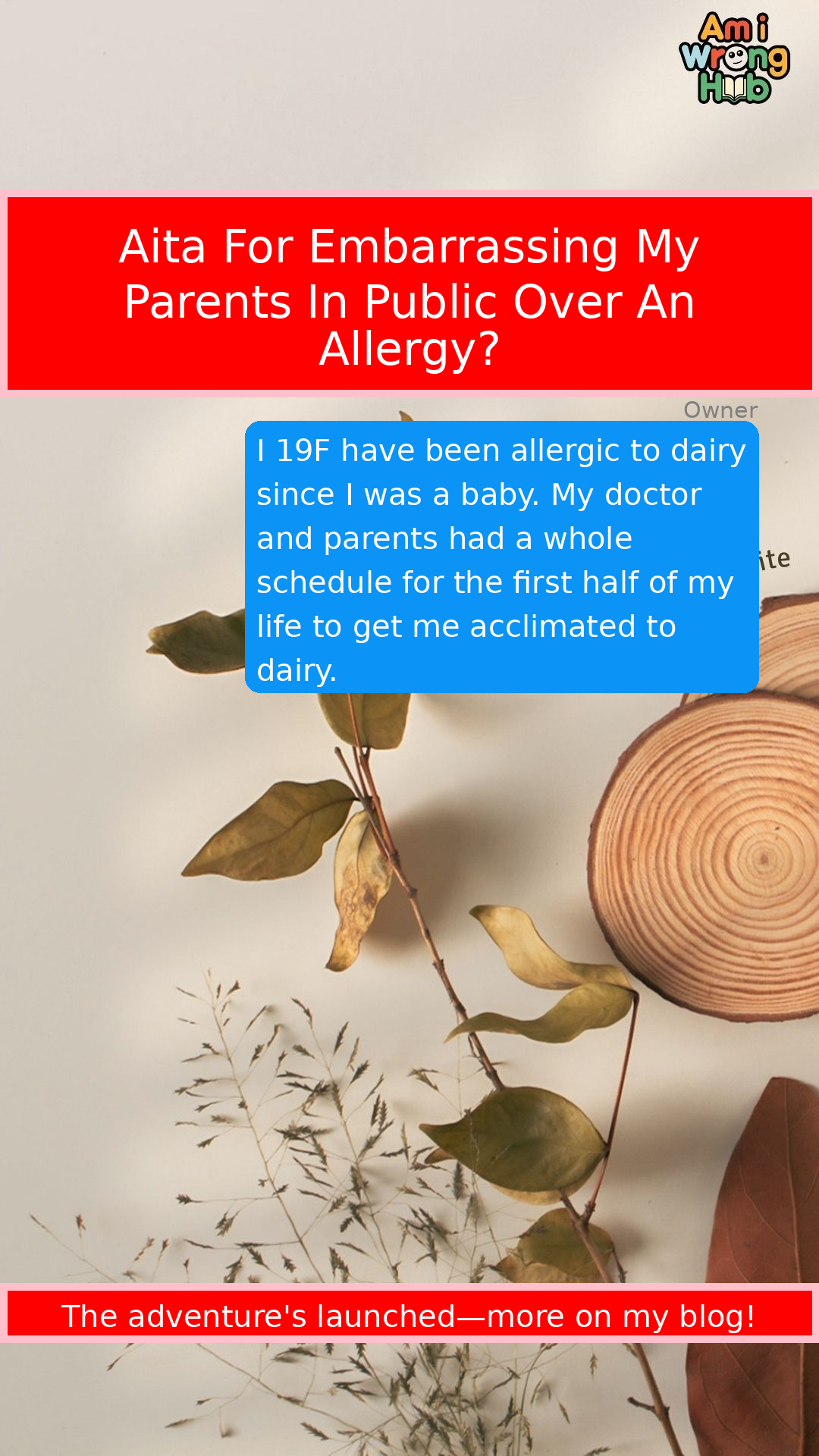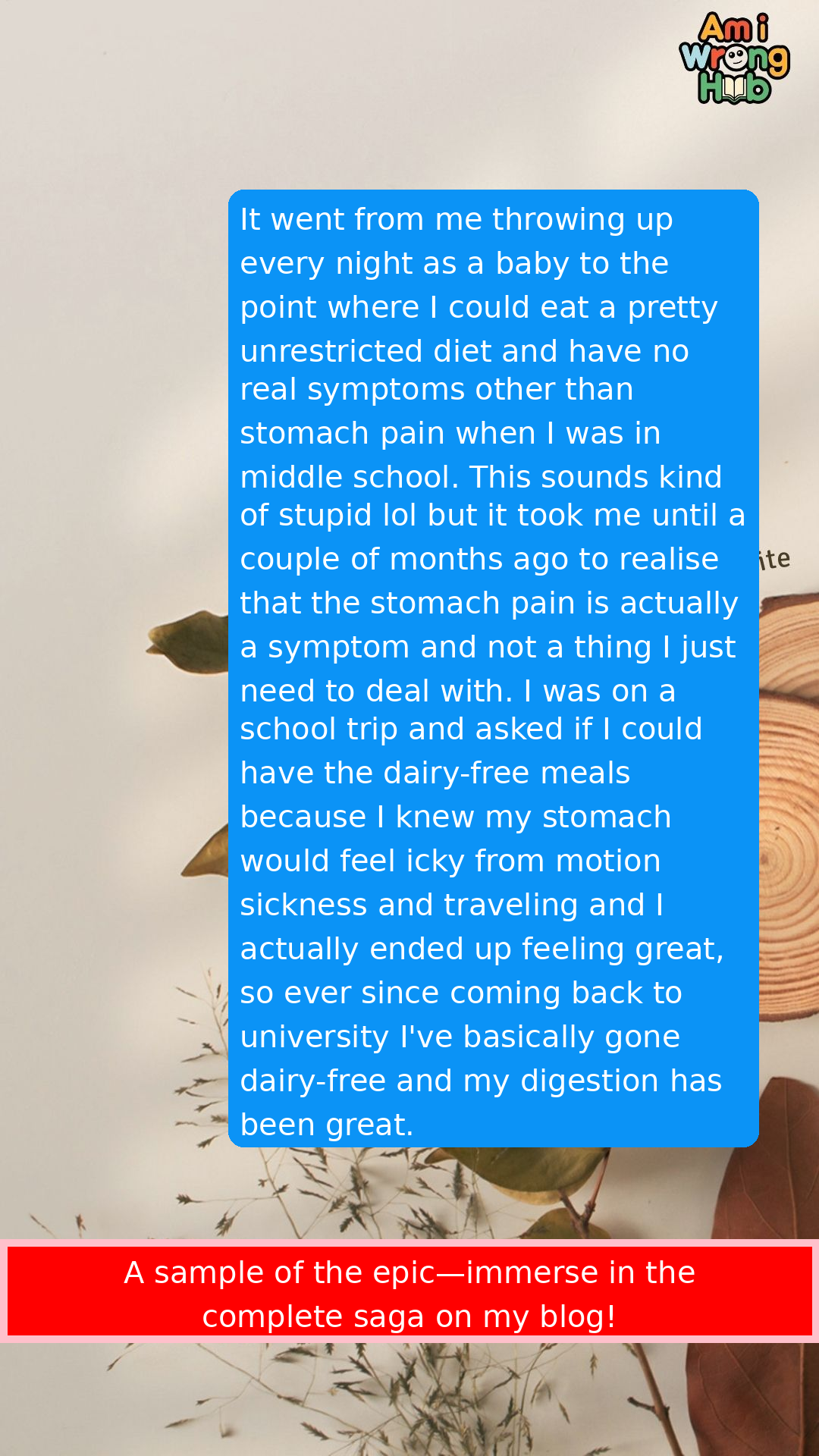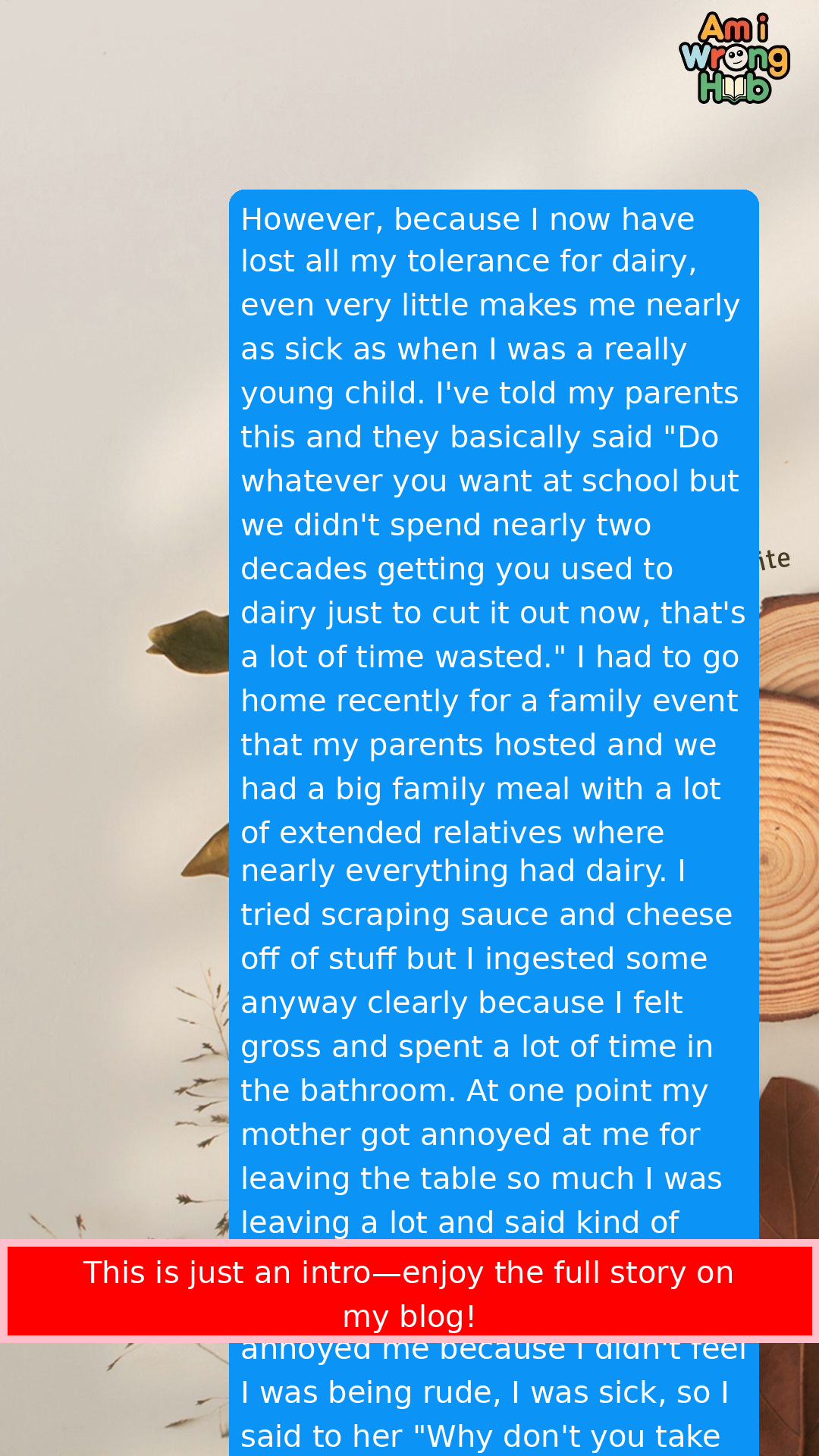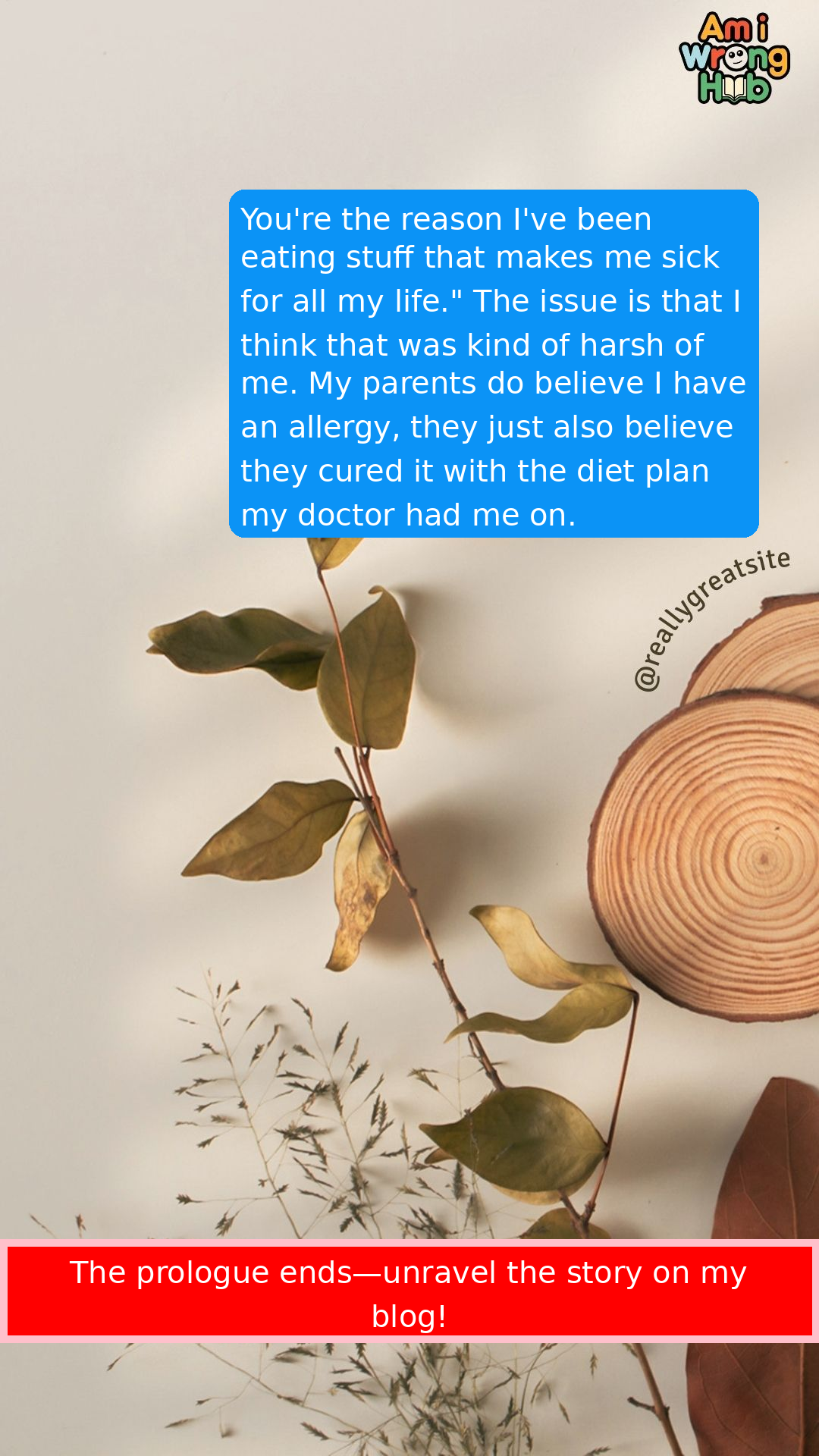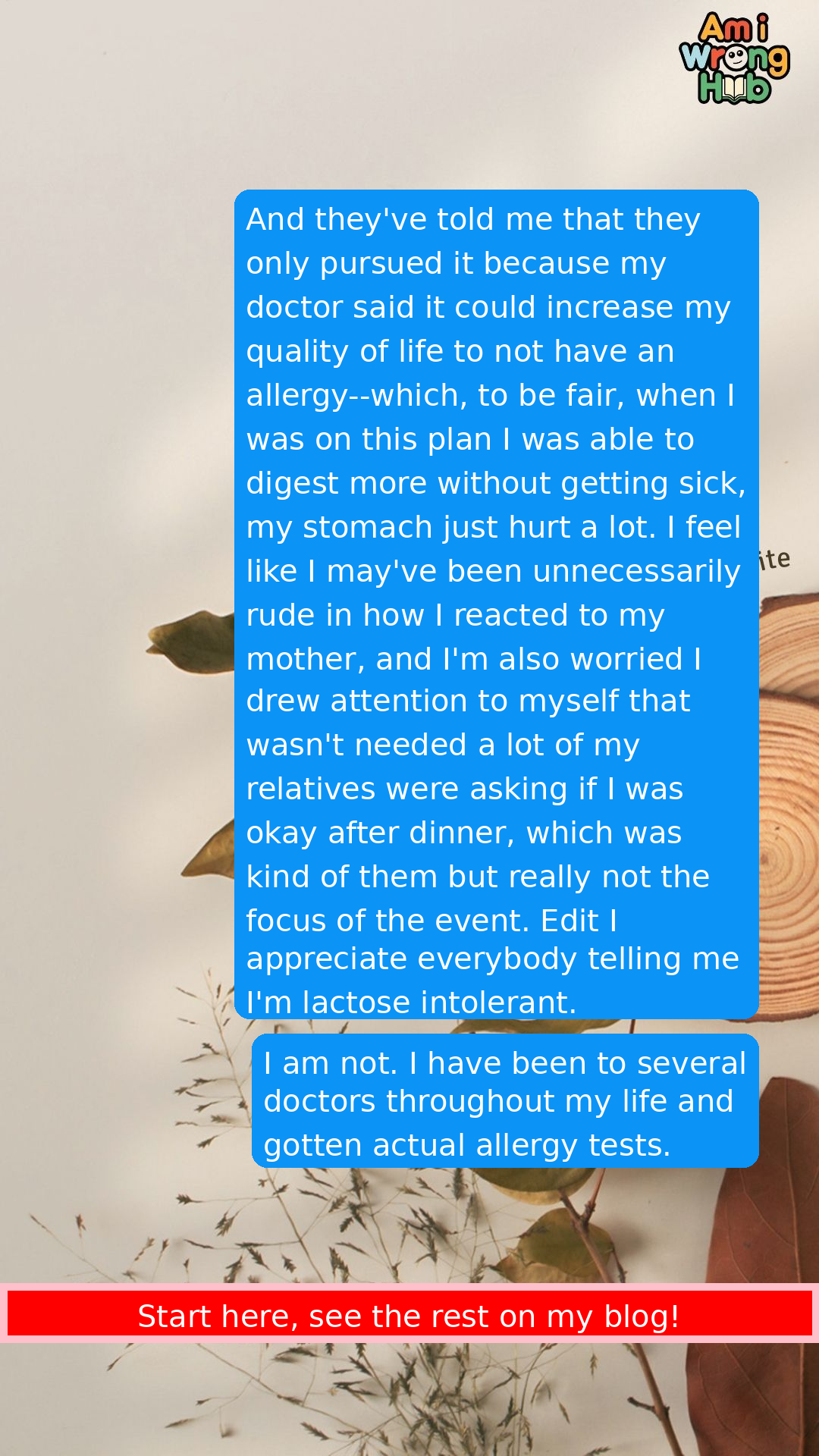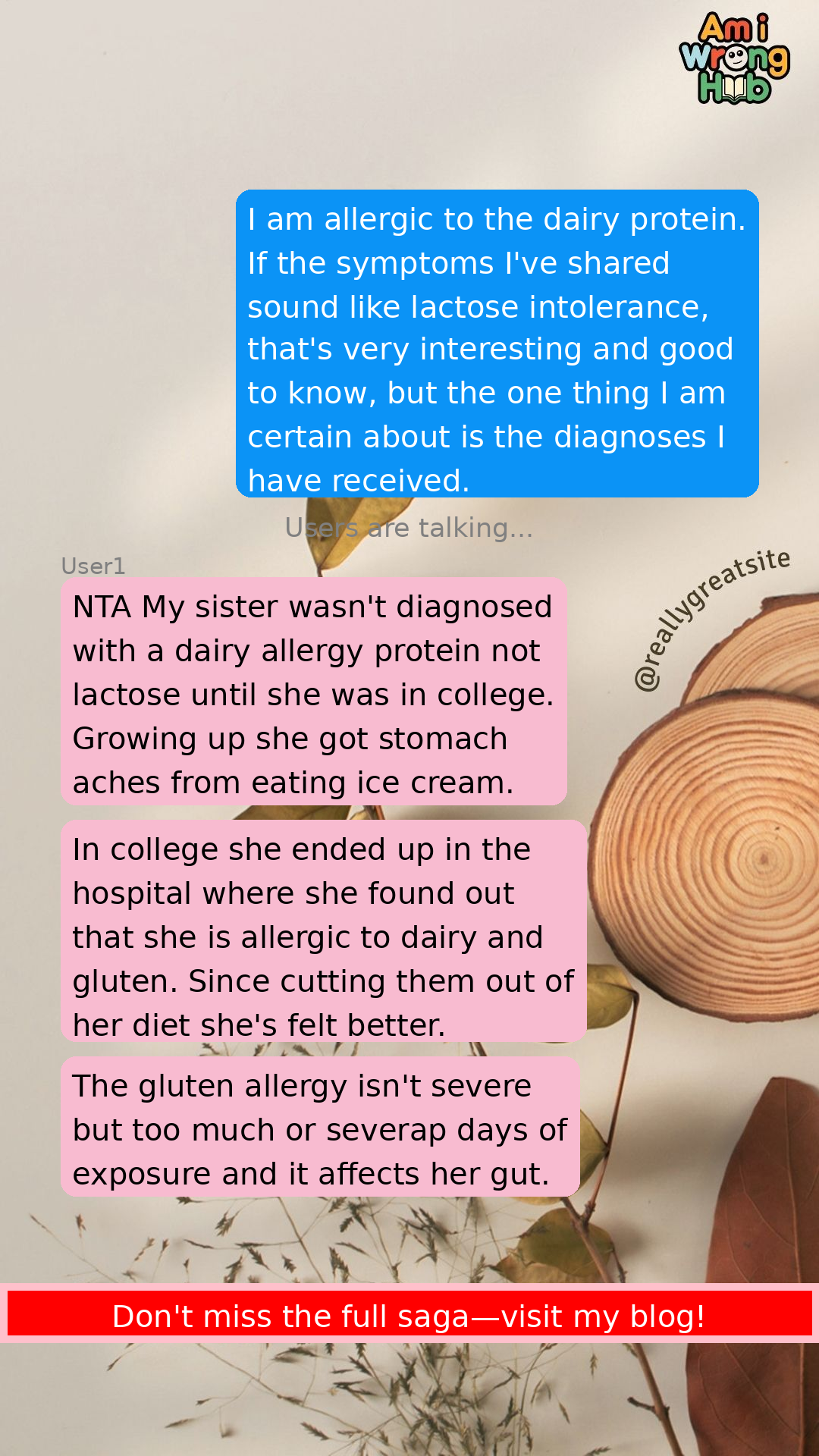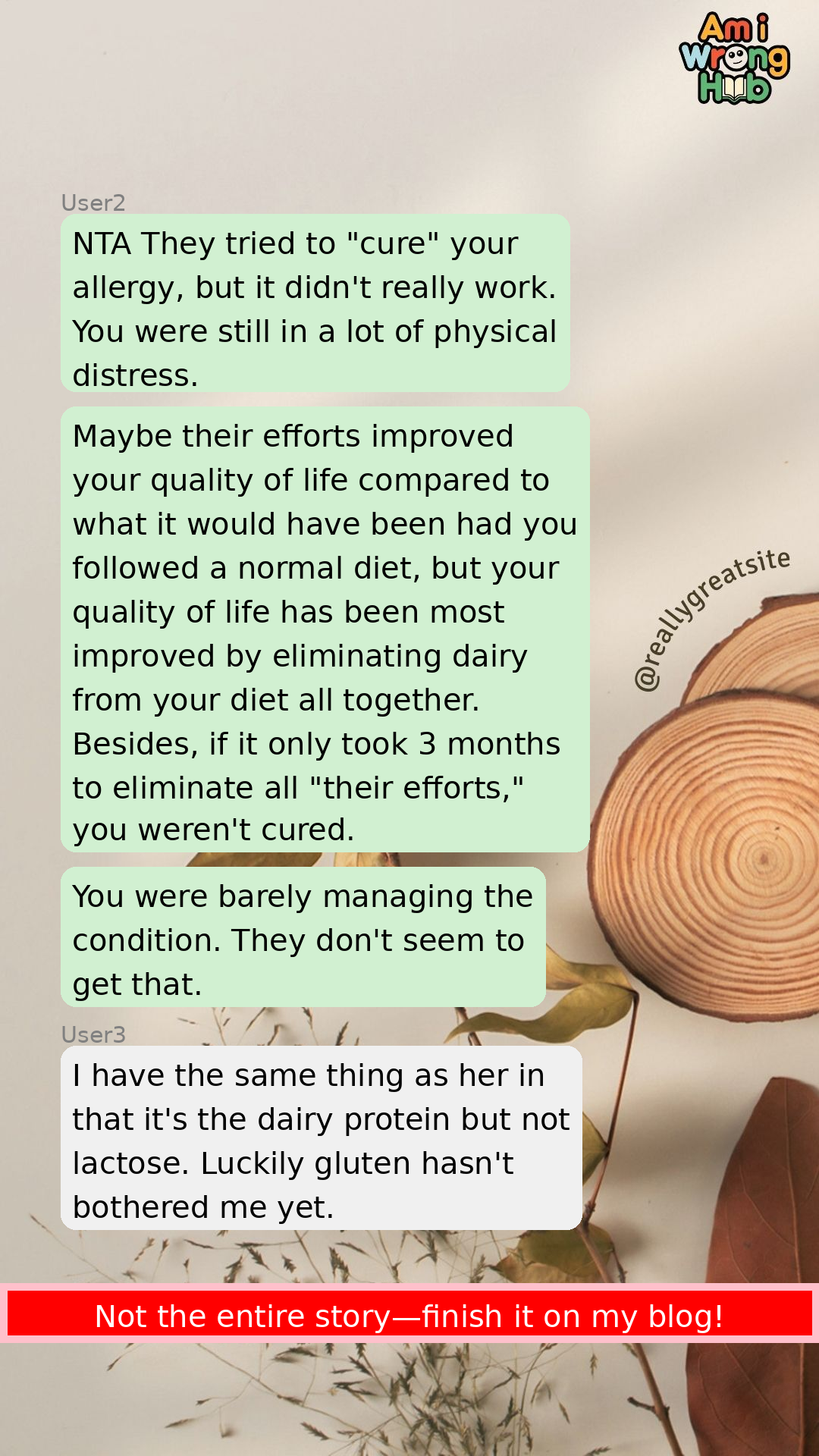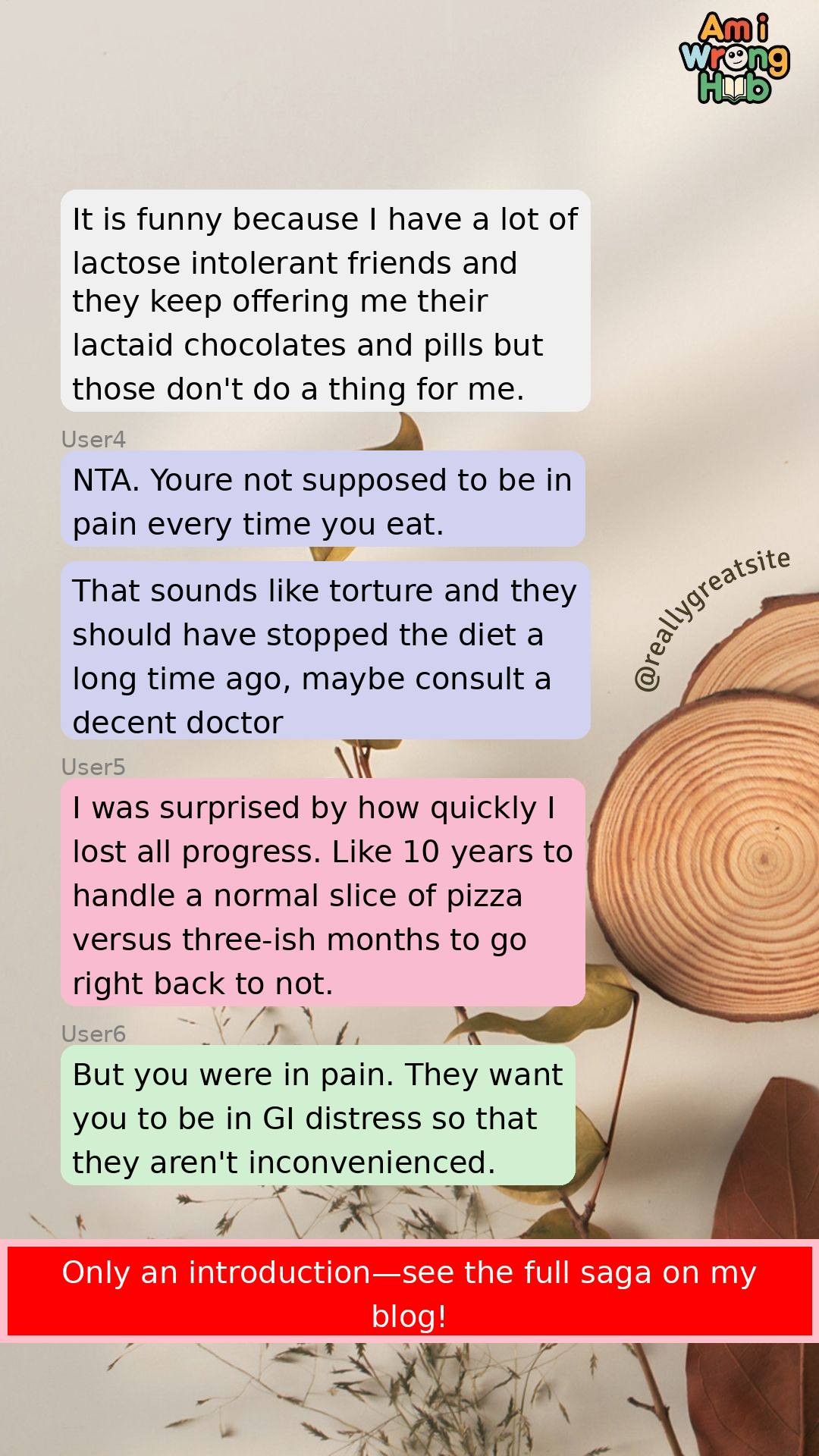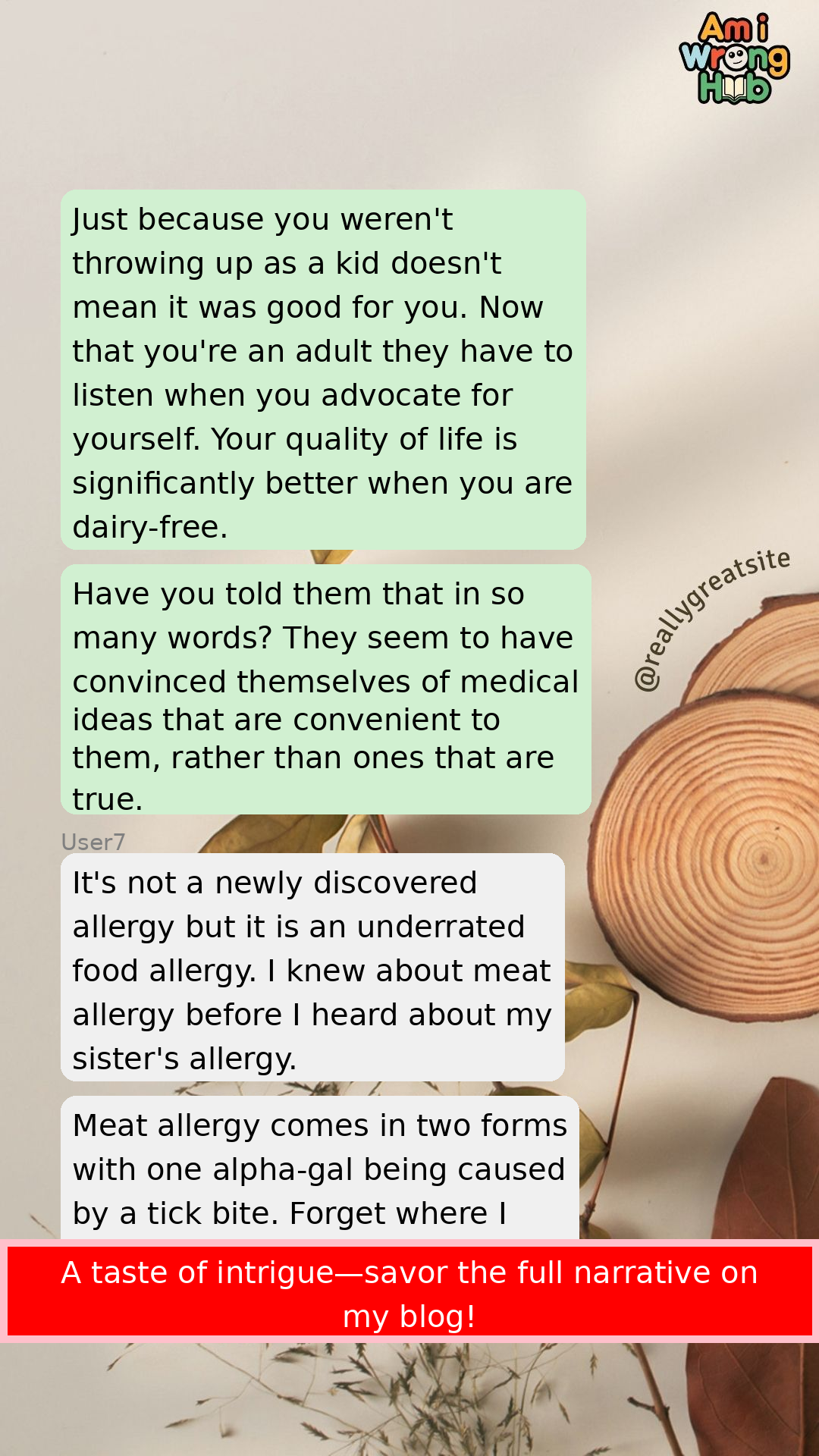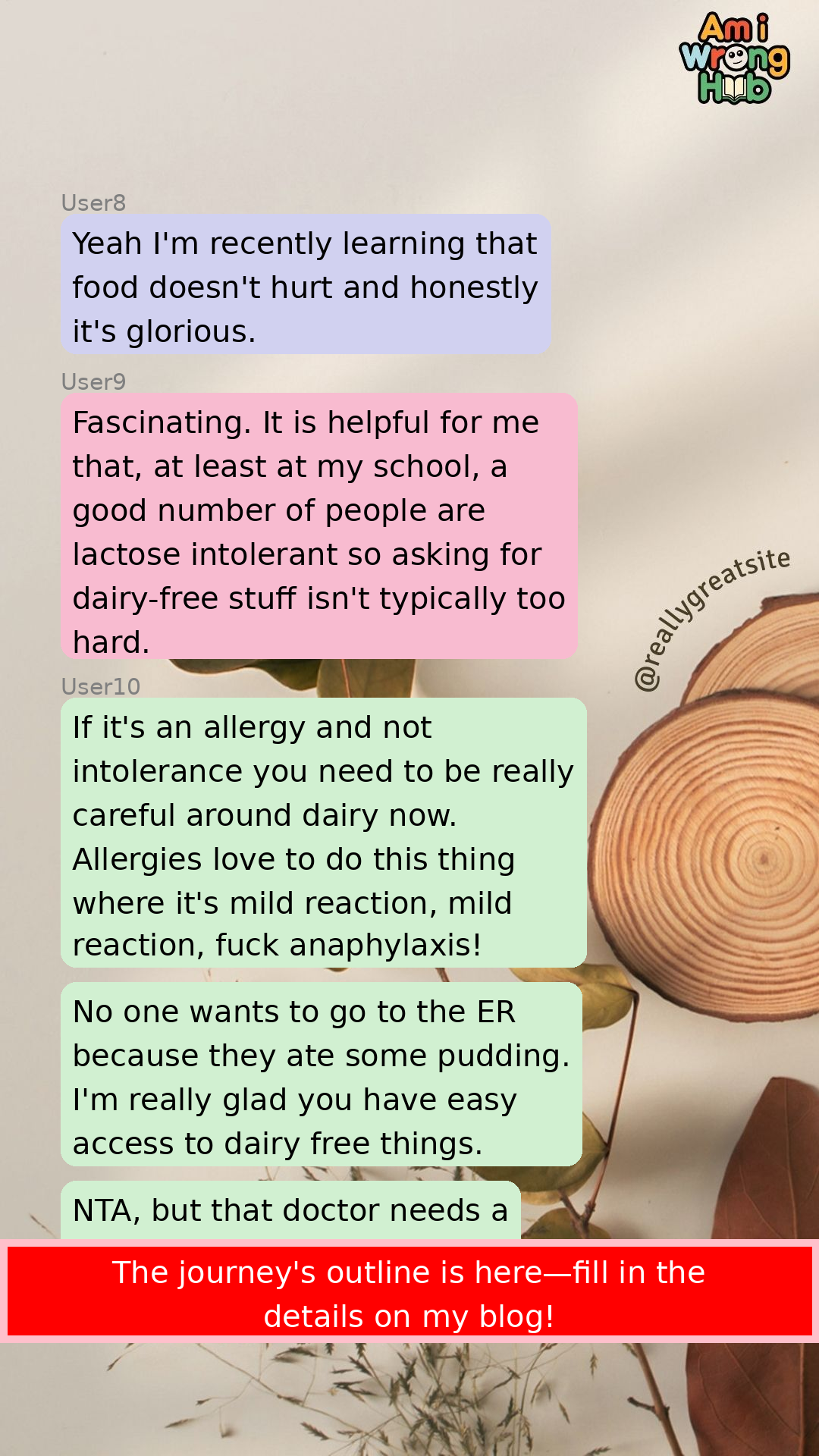AITA for embarrassing my parents in public over an allergy?
 Image credit: Pixabay (This is example image – Not the actual photo)
Image credit: Pixabay (This is example image – Not the actual photo)
When Family Traditions Clash with Health Needs
A 19-year-old woman grapples with her lifelong dairy allergy as her parents insist on the effectiveness of a treatment plan they followed for years. After discovering that avoiding dairy significantly improves her health, she faces backlash from her family during a large gathering filled with dairy-laden dishes. When her mother accuses her of being rude for leaving the table frequently, tensions rise, leading to a heated exchange about the seriousness of her allergy. This relatable story highlights the struggle many face when personal health needs conflict with family expectations, prompting readers to reflect on their own experiences with health and family dynamics.
Family Drama Over Dairy Allergy
A 19-year-old woman (19F) has been navigating a long-standing dairy allergy since childhood. The situation escalated during a recent family event, leading to conflict with her parents. Here’s a breakdown of the events:
- Background:
- Diagnosed with a dairy allergy as a baby.
- Underwent a gradual acclimatization process with her doctor and parents.
- Initially experienced severe reactions, but developed some tolerance over the years.
- Realized recently that ongoing stomach pain was a symptom of her allergy, not just a normal issue.
- Decided to adopt a dairy-free diet, which significantly improved her digestion.
- Family Event:
- Attended a family gathering hosted by her parents, featuring a meal rich in dairy.
- Tried to manage her allergy by scraping off dairy products but still ingested some.
- Experienced severe discomfort and spent considerable time in the bathroom.
- Conflict with Parents:
- Mother expressed frustration over her frequent absences from the table, labeling her behavior as rude.
- The young woman responded by accusing her mother of not taking her allergy seriously.
- Felt guilty afterward, questioning whether her reaction was too harsh.
- Parental Perspective:
- Parents believe they successfully cured her allergy through the dietary plan.
- They pursued this plan based on a doctor’s advice, aiming to enhance her quality of life.
- While they acknowledge her allergy, they seem to dismiss her current dairy-free choices.
- Aftermath:
- Concerned about drawing attention to herself during the family event.
- Relatives expressed concern for her well-being, which she felt shifted focus away from the gathering.
- Wonders if her response to her mother was unnecessarily rude.
This situation highlights the complexities of family dynamics and the challenges of conflict resolution when it comes to health issues. The young woman is left contemplating her relationship with her parents and how to assert her needs without causing further tension, especially in light of wedding tensions that may arise in the future.
This is Original story from Reddit
 Image credit: Pixabay (This is example image – Not the actual photo)
Image credit: Pixabay (This is example image – Not the actual photo)
My Dairy Allergy Journey
I, 19F, have been allergic to dairy since I was a baby. My doctor and parents had a whole schedule for the first half of my life to get me acclimated to dairy. It went from me throwing up every night as a baby to the point where I could eat a pretty unrestricted diet and have no real symptoms other than stomach pain when I was in middle school.
This sounds kind of stupid lol, but it took me until a couple of months ago to realize that the stomach pain is actually a symptom and not a thing I just need to deal with. I was on a school trip and asked if I could have the dairy-free meals because I knew my stomach would feel icky from motion sickness and traveling. I actually ended up feeling great, so ever since coming back to university, I’ve basically gone dairy-free, and my digestion has been great.
However, because I now have lost all my tolerance for dairy, even very little makes me nearly as sick as when I was a really young child. I’ve told my parents this, and they basically said, “Do whatever you want at school, but we didn’t spend nearly two decades getting you used to dairy just to cut it out now; that’s a lot of time wasted.” I had to go home recently for a family event that my parents hosted, and we had a big family meal with a lot of extended relatives where nearly everything had dairy.
I tried scraping sauce and cheese off of stuff, but I ingested some anyway, clearly, because I felt gross and spent a lot of time in the bathroom. At one point, my mother got annoyed at me for leaving the table so much. I was leaving a lot and said kind of angrily, “Why are you being so rude at this event?”
This annoyed me because I didn’t feel I was being rude; I was sick. So I said to her, “Why don’t you take my allergy seriously? You’re the reason I’ve been eating stuff that makes me sick for all my life.” The issue is that I think that was kind of harsh of me.
My parents do believe I have an allergy; they just also believe they cured it with the diet plan my doctor had me on. They’ve told me that they only pursued it because my doctor said it could increase my quality of life to not have an allergy—which, to be fair, when I was on this plan, I was able to digest more without getting sick; my stomach just hurt a lot. I feel like I may’ve been unnecessarily rude in how I reacted to my mother, and I’m also worried I drew attention to myself that wasn’t needed; a lot of my relatives were asking if I was okay after dinner, which was kind of them but really not the focus of the event.
Edit: I appreciate everybody telling me I’m lactose intolerant. I am not. I have been to several doctors throughout my life and gotten actual allergy tests. I am allergic to the dairy protein.
If the symptoms I’ve shared sound like lactose intolerance, that’s very interesting and good to know, but the one thing I am certain about is the diagnoses I have received.
View the Original Reddit Post Here
Summary of Reddit Comments
The top Reddit comments indicate a strong consensus that the original poster (OP) is not at fault (NTA) for their dietary choices due to their dairy allergy. Many users emphasize that the OP’s quality of life has significantly improved after eliminating dairy, and they criticize the family’s insistence on a diet that caused physical distress. The comments highlight the importance of listening to one’s body and advocating for personal health needs.
Verdict: NTA
Expert Advice for Resolving the Conflict
Resolving family conflicts, especially those involving health issues, requires empathy, open communication, and a willingness to understand each other’s perspectives. Here are some practical steps for both the young woman and her parents to consider:
For the Young Woman (19F)
- Initiate a Calm Conversation: Choose a time to talk when everyone is relaxed. Express your feelings about the recent family gathering and how your allergy affects you.
- Educate Your Parents: Share information about your dairy allergy, including how it impacts your health. Provide resources or articles that explain the seriousness of food allergies.
- Set Boundaries: Clearly communicate your dietary needs and the importance of adhering to a dairy-free diet for your well-being. Make it clear that this is not just a preference but a necessity.
- Express Gratitude: Acknowledge your parents’ efforts in managing your allergy in the past. Let them know you appreciate their intentions, even if the approach has changed.
- Suggest Compromises: Propose family meals that include dairy-free options. This way, you can enjoy gatherings without compromising your health.
For the Parents
- Listen Actively: Approach the conversation with an open mind. Allow your daughter to express her feelings without interruption or judgment.
- Validate Her Experience: Acknowledge that her allergy is real and can cause significant discomfort. Avoid dismissing her current dietary choices as unnecessary.
- Educate Yourselves: Take the time to learn about food allergies and their implications. Understanding the medical aspects can help you empathize with your daughter’s situation.
- Support Her Choices: Respect her decision to follow a dairy-free diet. Encourage her to take care of her health, even if it differs from what you believe is best.
- Foster Open Communication: Create an environment where your daughter feels comfortable discussing her health needs. Regular check-ins can help prevent misunderstandings in the future.
Moving Forward
Family dynamics can be challenging, especially when health issues are involved. By taking these steps, both the young woman and her parents can work towards a more understanding and supportive relationship. Remember, the goal is to foster love and respect while prioritizing health and well-being.
Join the Discussion
 Image credit: Pixabay (This is example image – Not the actual photo)
Image credit: Pixabay (This is example image – Not the actual photo)
What do you think? Would you have handled this differently?
Share your thoughts below! Vote: Do you agree with Reddit’s verdict?
